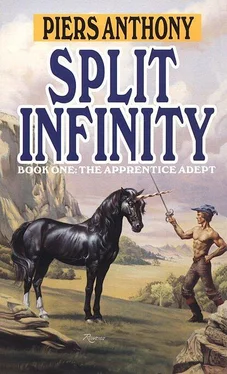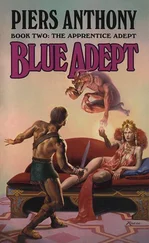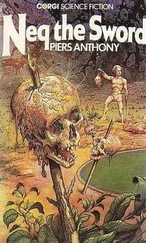Piers Anthony - Split Infinity
Здесь есть возможность читать онлайн «Piers Anthony - Split Infinity» весь текст электронной книги совершенно бесплатно (целиком полную версию без сокращений). В некоторых случаях можно слушать аудио, скачать через торрент в формате fb2 и присутствует краткое содержание. Год выпуска: 2011, Жанр: Фэнтези, на английском языке. Описание произведения, (предисловие) а так же отзывы посетителей доступны на портале библиотеки ЛибКат.
- Название:Split Infinity
- Автор:
- Жанр:
- Год:2011
- ISBN:нет данных
- Рейтинг книги:5 / 5. Голосов: 1
-
Избранное:Добавить в избранное
- Отзывы:
-
Ваша оценка:
- 100
- 1
- 2
- 3
- 4
- 5
Split Infinity: краткое содержание, описание и аннотация
Предлагаем к чтению аннотацию, описание, краткое содержание или предисловие (зависит от того, что написал сам автор книги «Split Infinity»). Если вы не нашли необходимую информацию о книге — напишите в комментариях, мы постараемся отыскать её.
Split Infinity — читать онлайн бесплатно полную книгу (весь текст) целиком
Ниже представлен текст книги, разбитый по страницам. Система сохранения места последней прочитанной страницы, позволяет с удобством читать онлайн бесплатно книгу «Split Infinity», без необходимости каждый раз заново искать на чём Вы остановились. Поставьте закладку, и сможете в любой момент перейти на страницу, на которой закончили чтение.
Интервал:
Закладка:
The weapons were good, of course, and as similar to each other as modern technology could make them. Each party took one, went to the centermark of the range, stood back to back, and began the paceoff at the sound of the timing bell. Ten paces, turn and fire—each pace measured by the metronome. The man who turned and/or fired too soon would be disqualified; the tenth beat had to sound.
Some people who were excellent shots in practice were bad ones in such duels. They had to have time to get set, to orient on the target—and here there was neither time nor any fixed target. Some lost their nerve when confronting an actual opponent who was firing back. Special skills and nerve were required for this sort of match. Both Stile and Tome possessed these qualities.
At the tenth beat Stile leaped, turning in air to face his opponent. Tome merely spun in place, withholding his shot until he fathomed Stile’s motion. He knew Stile seldom fired first; Stile preferred to present a difficult target, encouraging the other to waste his only shot.
Then Stile could nail him at leisure. Tome was too smart for that, Stile landed, plunged on into a roll, flipped to his feet and jumped again. Had Tome figured him for a straight bounce, his shot would have missed; but Tome was still being careful. His pistol was following Stile’s progress, waiting for the moment of correct orientation.
That moment never came. In midair Stile fired. A red splash appeared in the center of Tome’s chest, marking the heart. Contrary to popular fancy, the human heart was centered in the chest, not set in the left side.
Tome spread his hands. He had waited too long, and never gotten off his shot. He was officially dead.
Tome washed off the red stain while Stile registered the win with the Game computer outlet. They shook hands and returned to the Game-annex. Their names had already exchanged rungs. Stile punched Rung Eight, his next challenge. He wanted to capture as many rungs as he could before the alarm spread—and before news of his present weakened condition also got about. If his opponents thought it through, they would force him into the more grueling physical Games, where he would be weakest.
The challengee appeared. He was a squat, athletic man named Beef. “Tome, you challenging me?” he demanded incredulously.
“Not I,” Tome said, gesturing to the ladder.
Beef looked. “Stile! What move are you making?”
“A challenge move,” Stile said.
Beef shrugged. “I can’t decline.”
They went to a booth and played the grid. Beef was unpredictable; often he picked unlikely columns, just for the hell of it. Stile selected B. TOOL, hoping the other would not pick 3. CHANCE.
His hope was vain. Beef was more curious about Stile’s motive than about the outcome of the Game, and they intersected at 3B. The home of roulette, dice, —all manner of gambling devices. Precious little skill. Stile could take Beef in most games of skill—but chance made it even.
Yet already he was maneuvering to upgrade his chances, playing the subgrid, finessing the choices in the way he had. Suddenly it came up CARDS. Cards were technically instruments of chance—but there were quite a number of games, like bridge and poker, where skill of one sort or another counted. All he had to do was pack the final grid with this type.
Beef, however, was alert to this, and selected games like blackjack and high-card-draw. He wanted to make Stile sweat, and was succeeding. It was very bad to have an opponent who cared less about the outcome than Stile did; there was little strategic leverage. Beef made his placements on the grid so that Stile could not establish a full column of his own choices. Three of one player’s preferences in a row meant that player could select that row and have a commanding advantage. The chances of establishing a game utilizing reasonable skill remained 50-50, and Stile was hurting. He had to have better odds!
But Stile knew a skill variant of a chance game that Beef evidently did not. He slipped it in, played for it, and got it: War, Strategy.
The ordinary card game of War consisted of dealing the pack randomly into two piles, with each player turning up cards on one-to-one matches. The higher card captured the lower, and both went into the winner’s victory pile. When the first piles were through, the piles of winnings would be shuffled and played in the same fashion, until finally one player had won the en- tire deck. It was pure chance, and could take many hours to finish. The strategy variant, however, permitted each player to hold his cards in his hand, selecting each card to play. When both were laid face down on the table, they would be turned over, and the higher card won. This play was not truly random; each player could keep track of his assets and those of his opponent, and play it accordingly. He could psych the other player out, tricking him into wasting a high card on a low one, or into losing a trick he should normally have won by playing a card too low. Games were normally much shorter than those of the pure-chance variation, with the superior strategist winning. The element of pure chance could not be reintroduced; a strategist could beat a hand played by chance. Thus Stile had his opportunity to exert his skill, judging his opponent’s intent and playing no higher than needed to win.
They played, and soon Stile’s expertise told. He took queens with kings, while yielding deuces to aces. Steadily his hands grew, providing him with more options, while those of his opponent shrank. Luck? The luck had been in the grid.
In due course Stile was able to play seven aces and kings in succession, wiping out Beef’s queen-high remaining hand of seven with no luck allowed at all. He had won, and Rung Eight was his.
Beef shook his head ruefully. “I will remember that variant,” he said. He didn’t mind losing, but he hated to be outsmarted so neatly.
They returned to the Game-annex. But Stile’s two wins had attracted notice. A knot of serfs stood before the 35M ladder. “Hey, Stile,” a woman called. “Are you making your move this year?”
He should have known privacy would be impossible. He was too well known in these circles, and what he was doing was too remarkable. “Yes,” he said shortly, and made his way to the ladder. He punched the challenge for Rung Seven.
The holder of that Rung was already present. He was Snack, an average-heighted man who specialized in board games and light physical exercises. He was more formidable than the two Stile had just taken, but still not really in Stile’s class.
“I will respond to your challenge in one day,” Snack said, and left.
This was exactly the sort of thing Stile had feared. A rung-holder had to meet a challenge from the rung below, but could delay it one day. Stile had to rise rung by rung; he could not challenge out of order. He had no choice but to wait—and that would interfere with his return to Phaze.
Sheen took his arm. “There’ll be an audience tomorrow,” she said. “When a player of your caliber makes his move for a tenure-abridging Tourney this close to the deadline, that’s news.”
“I wanted to qualify quickly, so I could return to Phaze before the Tourney,” Stile said. “Neysa is waiting and worrying.”
Even as he said it, he knew he should not have. Somehow the words got out before his mental intercept signal cut them off. “Cancel that,” he said belatedly.
She looked straight ahead. “Why? I’m only a machine.”
Here we go again. “I meant I promised to return to meet her at the palace of the Oracle. It was her question to the Oracle that freed me. The only one she can ask in her lifetime—she used it up just to help me. I must return.”
“Of course.”
“I made a commitment!” he said.
Читать дальшеИнтервал:
Закладка:
Похожие книги на «Split Infinity»
Представляем Вашему вниманию похожие книги на «Split Infinity» списком для выбора. Мы отобрали схожую по названию и смыслу литературу в надежде предоставить читателям больше вариантов отыскать новые, интересные, ещё непрочитанные произведения.
Обсуждение, отзывы о книге «Split Infinity» и просто собственные мнения читателей. Оставьте ваши комментарии, напишите, что Вы думаете о произведении, его смысле или главных героях. Укажите что конкретно понравилось, а что нет, и почему Вы так считаете.










